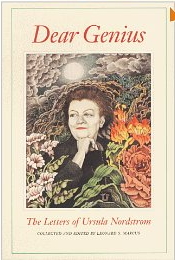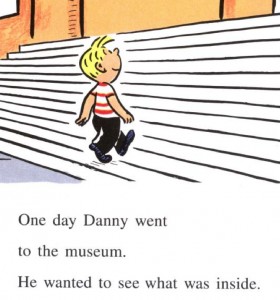Dear Genius
 A book of letters I ought to have included in my ode to epistles and epistolaries the other day: Dear Genius: The Letters of Ursula Nordstrom. Miss Nordstrom, the pioneering editor behind Harper’s Department of Books for Boys and Girls from 1940 to 1973, was something of a genius herself. The list of children’s classics she was responsible for publishing is staggeringly long and awesome: Little Bear, Where the Wild Things Are, Goodnight Moon, Danny and the Dinosaur, Where the Sidewalk ends, Harold and the Purple Crayon, oh and a little thing called Charlotte’s Web—to name a very few.
A book of letters I ought to have included in my ode to epistles and epistolaries the other day: Dear Genius: The Letters of Ursula Nordstrom. Miss Nordstrom, the pioneering editor behind Harper’s Department of Books for Boys and Girls from 1940 to 1973, was something of a genius herself. The list of children’s classics she was responsible for publishing is staggeringly long and awesome: Little Bear, Where the Wild Things Are, Goodnight Moon, Danny and the Dinosaur, Where the Sidewalk ends, Harold and the Purple Crayon, oh and a little thing called Charlotte’s Web—to name a very few.
Dear Genius is a collection of letters she wrote to authors, illustrators, reviewers, even parents and children who had written with responses to her books. She is unfailingly poised, charming, and insightful, even when responding to criticism. And her voice, oh her wonderful voice! Her letters are simply crammed with personality—she is wry, teasing, incisive, direct, and altogether brilliant.
Her editorial letters provide a fascinating look at the history of children’s publishing in America, both on the grand scale of publishing trends and literary vision, and on the micro scale of word choices for a single line of a specific book. For instance, in a 1957 letter to Syd Hoff about Danny and the Dinosaur, an early “I Can Read” book for beginning readers:
I think you should just say “One day Danny went to the museum.” (He didn’t actually want to “see how the world looked a long, long time ago,” as you put it, do you think? Very unchildlike. He might have wanted to go to see the dead mummies, or other specific things in a museum, but I wouldn’t mention that here because you mention it on following pages. So just have a simple statement on this first page. “One day Danny went to the museum.”) It is pretty short and if you can think of one more short sentence for this page by all means add it. I can’t come up with any suggestion myself. Page 8: You’ll have to simplify what he saw on this page. NOT THAT I WANT YOU TO GET SELF-CONSCIOUS ABOUT “I CAN READ.” I told you I wanted you to let me worry about that aspect and that’s all I’m doing now. You could just say “He saw Indians. He saw bears. He saw…” I haven’t been in a museum in 150 years and can’t think of anything else, but you can.
Or, in September 1963:
Maurice, before I sent the paste-up I went through it, rereading the words, and looking at the pictures again. It is MOST MAGNIFICENT, and we’re so proud to have it on our list. When you were much younger, and had done only a couple of books, I remember I used to write you letters when the books were finished, and thank you for “another beautiful” job—or some such dopiness. Now you’re rich and famous and need no words of wonder from me. But I must send them, anyhow, when I look through Where the Wild Things Are. I think it is utterly magnificent, and the words are beautiful and meaningful, and it does just want you wanted it to do. And you did just what you wanted to do.
Or, from a reply to a reader of Little House on the Prairie in 1952:
Your letter to Mrs. Wilder…came several weeks ago. We took the liberty of opening it as we do many of the letters that are addressed to Mrs. Wilder…[she] is now in her late eighties and we try to handle much of her correspondence here.
We were indeed disturbed by your letter. We knew that Mrs. Wilder had not meant to imply that Indians were not people and we did not want to distress her if we could possibly avoid it. I must admit to you that no one here realized that those words read as they did. Reading them now it seems unbelievable to me that you are the only person who has picked them up and written to us about them in the twenty years since the book was published. We were particularly disturbed because all of us here feel just as strongly as you apparently feel about such subjects, and we are proud that many of the books on the Harper list prove that. Perhaps it is a hopeful sign that though such a statement could have passed unquestioned twenty years ago it would never have appeared in anything published in recent years.
Instead of forwarding your letter to Mrs. Wilder I wrote her about the passage and said that in reprinting we hoped that she would allow us to change it. I have just received her answer. She says: “You are perfectly right about the fault in Little House on the Prairie and have my permission to make the correction you suggest. It was a stupid blunder of mine. Of course Indians are people and I did not mean to imply they were not.” We are changing the next printing to read “There were no settlers.”
Fascinating. I could quote from this book all day but you’re much better off scrounging up a copy yourself.

